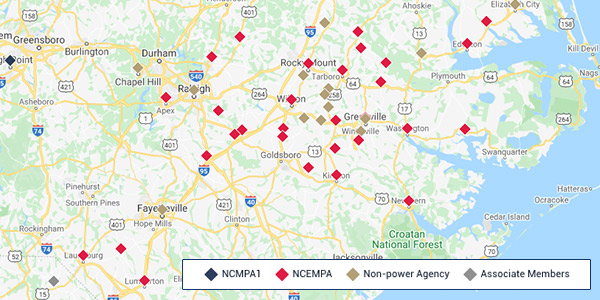FERC on Thursday granted North Carolina Eastern Municipal Power Agency’s (NCEMPA) request for a declaratory order allowing it to add battery storage to its system under its full-requirements power purchase agreement with Duke Energy Progress (EL20-15).
The commission rejected Duke’s opposition to the request, ruling that the PPA permits NCEMPA to use battery storage technology as either demand-side management or demand response. The commission cited a sentence in the agreement stating that it does not “preclude [NCEMPA] and/or its members from instituting or promoting activities designed, in whole or in part, to manage or reduce the members’ demands and/or loads through demand-side management programs.”
“When used as NCEMPA proposes, battery storage technology is inherently a load-shape-modifying device, designed not to reduce a customer’s overall load, but to shift the incidence of such load, i.e., to manage the customer’s demands,” the commission said. “Similar to other demand-side management activities, such as pre-cooling buildings overnight or midday to avoid withdrawing energy to provide air conditioning during afternoon peak-load conditions, NCEMPA’s proposed use of battery storage technology simply determines when energy is consumed.”
NCEMPA said it intended to use storage to reduce its load when prices are high because of increased system demand.
The commission noted that Order 841 — although not applicable in this case because NCEMPA is not part of an RTO or ISO market — “confirms that battery storage resources are capable of providing demand response service.”
The commission rejected Duke’s “restrictive interpretation” that battery storage is a form of generation, saying that it allows “a withdrawal of energy for later injection back onto the grid.”
Duke’s “argument ignores the fact that NCEMPA still would be purchasing its full energy requirements from Duke. The power used to charge the batteries would come from Duke’s generation, and then that power would be discharged from the batteries to serve NCEMPA’s customers,” FERC said. “The fact that NCEMPA is buying power from Duke at one hour and then using that same power from Duke in another hour does not change the fact that NCEMPA is meeting its full requirements through Duke.”
NCEMPA serves 32 cities and towns with their own municipal electric distribution systems. Between 1981 and 2015, it was the co-owner with Duke of two coal-fired generating units and three nuclear-fueled generating units operated by Duke.





